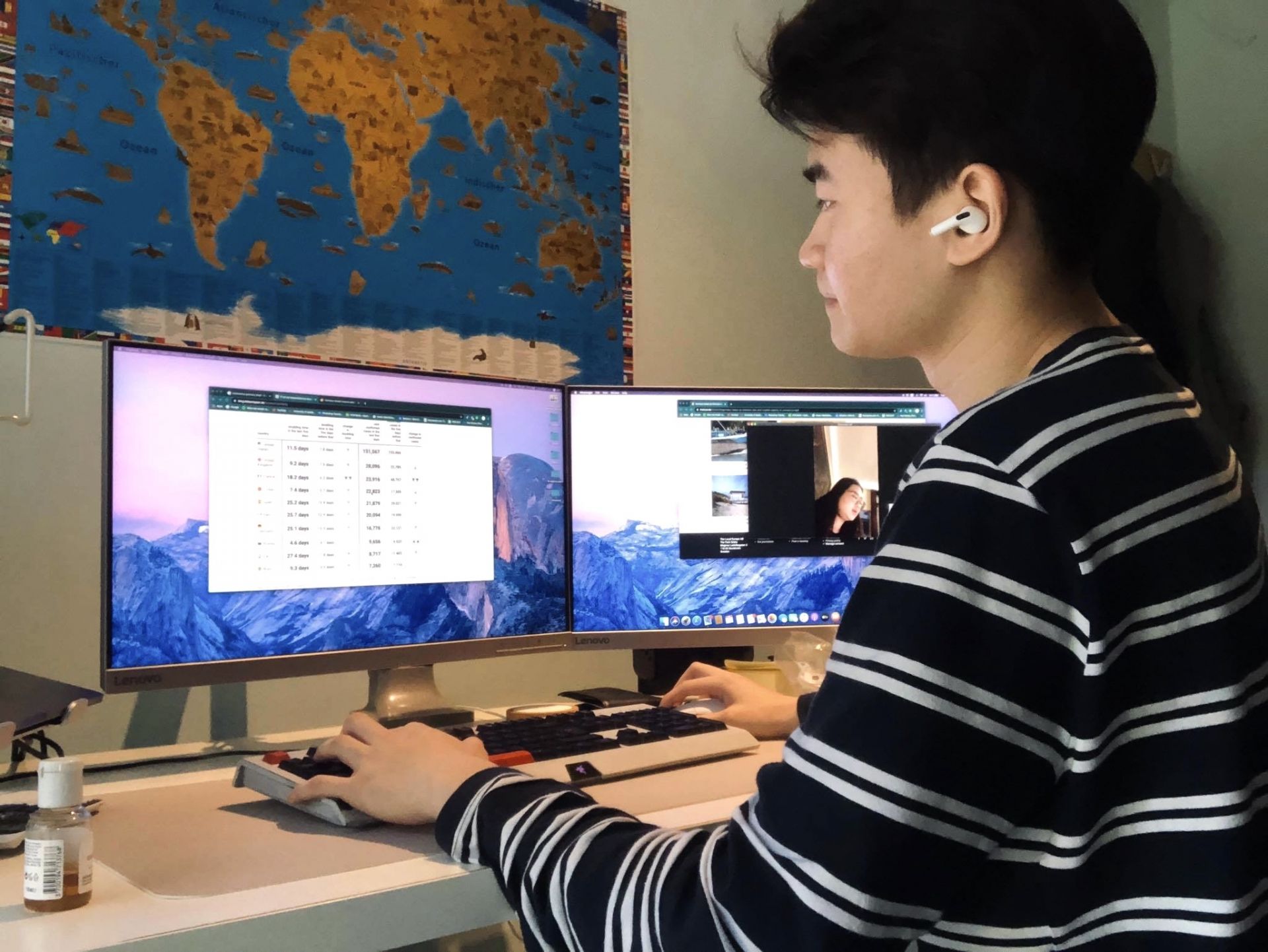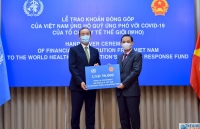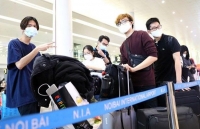
Vietnamese students worldwide face difficulties amid COVID-19 pandemic
Latest
| TIN LIÊN QUAN | |
| Foreign media lauds Vietnam's effort in COVID-19 fight | |
| Two more COVID-19 cases confirmed, total rises to 270 | |
 |
| Tram Nguyen enjoys a warm spring morning after finishing her 14 days in the quarantine area in Ha Noi. |
Tram Nguyen doesn’t feel she’s received any support from the U.S. government amid the COVID-19 outbreak.
Nguyen is an international student at Ohio University. Under the impact of the pandemic, her university decided to move all students living in residence to a specific dorm and shut down the rest of the campus, with the exception of the dining hall.
“There was just one dining hall opened at specific time slots, so it’s not really convenient,” she said.
“The university made it really complicated about our meal plans and everything in town was shut down so we didn’t have much choice.”
Because all her classes have now moved online, Nguyen decided to go back to her home country of Vietnam.
After arriving at Noi Bai International Airport, Nguyen was forced to stay in a centralized quarantine region for 14 days before she was allowed home.
Tram Nguyen isn’t the only one who has struggled with the difficult decision as to whether to stay abroad, or return home amid the COVID-19 pandemic.
The coronavirus outbreak has affected billions of students worldwide, especially international students.
Hang Dang, a second-year student at Earlham College, Indiana has also made the tough decision to go home.
Dang said she doesn’t expect to receive any support from the U.S. government. In the U.S., people with a Social Security Number (SSN) can receive unemployment or financial benefits from the government. However, being an international student, Dang doesn’t qualify. She doesn’t think she could ask for the same deal.
“Subsidy programs for students like us depending mostly on the business or organization we’re working for, not the government,” Dang said.
As the number of positive cases in the U.S. increased, Dang said she felt safer back in her home country.
“There is a large amount of immigration leaving the US to go home now. It makes me feel pretty concerned. I only want to be able to go home.”
Dang left the US to go home later last March.
But it’s not the same story for everyone.
Due to quarantine regulations and flight restrictions under the COVID-19 impact, lots of international students choose to stay in their current country.
 |
| Van Ngo (right) and her roommate Lex Grey (left) at Port of Charlottetown, November 2019. Ngo said she missed the good old days “when things were still normal.” |
Van Ngo is a fourth-year student, majoring in business at UPEI, Canada.
Because she is set to graduate this year, Ngo has decided to stay in P.E.I. However, there won’t be any graduation ceremony. Ngo said she felt sad about not having the chance to walk across the graduation stage.
“It would be ‘once in a lifetime event’ that I might never be able to experience again.”
During this time of uncertainty, she said she doesn’t know what to do and what to expect.
“I feel lost about my future.”
Being far away from home is difficult, Ngo said.
“If there’s anything bad happens and I’m at home, at least I still have my parents by my side.
“If I can say one word, it would be ‘downhearted.’”
However, Ngo said she felt safe staying in P.E.I. because the local and national governments have promptly responded to the pandemic.
“I can see their great efforts in trying to contain the virus and protect people.”
Even though she isn’t in need of financial, medical or mental support from the government, there are many incentives and programs to help people.
Ngo appreciates the effort UPEI has made to support students, especially international ones like her.
“I’m grateful for the support from the school administration to move classes online, maintain residence services and let the final year students graduate on time.”
Madeleine Dinh, a third-year UPEI student also feels grateful for the government’s support.
As a landlord, it’s been difficult for her to find renters since the COVID-19 pandemic began, Dinh said.
“Everything has been shut down. People have lost their jobs and been laid off without an estimated time of returning to their work, so it’s hard for everyone to pay their bills.”
However, P.E.I. government has established programs for Islanders to support people during this challenging time.
“I’m glad that I’ve had received some support from the government. I was scared that I’d be left behind.”
Yet, as many people are facing financial difficulties, Dinh said.
“I’m lucky I have some friends who are still renting my place to stay, at least for this summer. But I know there are many landlords out there who are constantly looking for tenants but they just couldn’t find any.
“This reality is certainly creating some serious financial concerns,” she said.
 |
| Duc Le surfed the web to find new statistics on coronavirus cases in Germany. |
Duc Le, a business student at the University of HTW Berlin, Germany knows how it feels dealing with financial difficulties while staying abroad.
COVID-19 has led to the closure of many restaurants, shopping malls and supermarkets including the one he works at.
“I work part-time as a cashier at a local supermarket. As the store only opens within a limited time, many of us have been laid off. We’ve lost our job, therefore, have no ability to pay the housing rental,” he said.
Like many other people, Le struggles to pay rent. He also finds it hard to afford tickets to fly back home, and worries about the risk of being infected while traveling abroad.
“Money gives me a bad headache whenever I think about my current situation,” he said.
The German government has issued many social policies to help workers as well as students, who are currently staying in Germany, Le said. Landlords have allowed tenants to live rent-free for three months, starting in March. But they are expected to pay back those months in June.
“Staying in Germany is the best choice for me now,” Le said. “I personally think the German government is handling pretty well in the pandemic.”
Ha Tran, a third-year tourism and travel management student at Sejong University in Seoul, Korea doesn’t think the Korean government has done a good job dealing with the coronavirus outbreak.
In some cities that are seriously affected like Daegu, the Korean government has decided to lock down these cities and ask citizens to only go out when necessary. However, in Seoul, everything remains almost the same, Tran said.
“People don’t seem to take it seriously. Not everyone wears face masks while going out. Restaurants and supermarkets still open as regular, and pile stocking isn't happening here.
“Particularly, I don’t see the government having any policy to support international students studying and living here like me, except letting us take online courses,” she said.
Meanwhile, back in Vietnam, Tram Nguyen is out of her 14-day quarantine.
She said the Vietnamese government has done a great job of taking care of students who study abroad.
“Since I’m back and go to the quarantine, I’ve received a lot of care from my government. I also saw and heard many stories from the news and social media about how the government got involved and supported its citizens.”
She was worried about her decision to go home during the pandemic.
“But after all, I felt relieved that I made the right decision. I feel safe to be home,” she said.
And she’s grateful to be able to enjoy the food she grew up with, once again, instead of a university dining hall.
“After a long flight and two weeks in quarantine, I was so hyped I can finally have a family dinner.”
 | Nearly five million workers affected by COVID-19 The COVID-19 pandemic has affected five million workers as of mid-April, bringing the first-quarter unemployment rate to a five-year high, according to the General Statistics ... |
 | Vietnam contributes US$50,000 to WHO's COVID-19 response fund Vietnam has handed over US$50,000 to the World Health Organization's COVID-19 Response Fund to support the United Nations’ agency in the fight against the novel coronavirus ... |
 | Vietnamese students abroad urged to avoid flight scam The Ministry of Education and Training (MOET) has called on Vietnamese students abroad to take caution with entities and individuals that collect deposits to arrange ... |

















